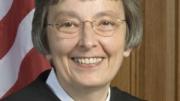The honorable Barbara A. Lenk, J.D. ’79, currently a senior associate justice of the Massachusetts Appeals Court, has been nominated to the Supreme Judicial Court by Governor Deval Patrick ’78, J.D. ’82. If confirmed by the Governor’s Council, Lenk would become the first openly gay justice on the commonwealth’s highest court. She and her partner married after a 2003 ruling by that court caused Massachusetts to become, on May 17, 2004, the first state to legalize same-sex marriage and only the sixth jurisdiction in the world to do so.
Born in Queens, New York, Lenk received her B.A. from Fordham in 1972 and a Ph.D. in political philosophy from Yale in 1978 before attending Harvard Law School. She focused her legal career on civil litigation with a specialty in First Amendment issues, and was appointed to the bench by then-governor William F. Weld ’66, J.D. ’70, in 1993.








